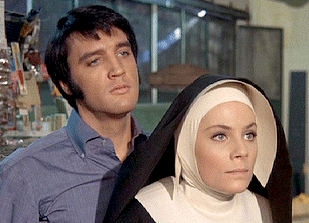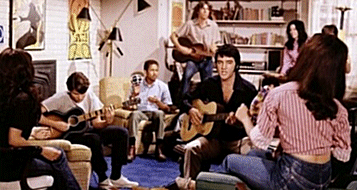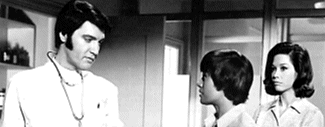Sixties
City presents
a wide-ranging series of
articles on all aspects of the Sixties, penned by the creator of the iconic
60s music paper Mersey
Beat
|
Sixties
City presents
a wide-ranging series of
articles on all aspects of the Sixties, penned by the creator of the iconic
60s music paper Mersey
Beat
|
||||||
|
| ‘A Change
of Habit’ was Elvis’ 31st and final film. Interest in his movies had entered
such a decline that although it was released nationwide in the United States
on November 10th 1969, it became the first Elvis movie in Britain not to
be screened in cinemas - it actually made its debut on television. His film
career had spanned 14 years from 1955 to 1969. The Universal Pictures/NBC
Production was 93 minutes in length, produced by Joe Connelly, directed
by William Graham with a screenplay by S.S.Schweitzer and Eric Bercovici
from a story by John Joseph and Richard Morris. It was actually inspired
by the real-life Sister Mary Olivia Gibson who worked with handicapped children
in Syracuse, New York. The film opens in a convent where the Mother Superior asks three nuns to venture into the world to do some good. They are Sister Michelle (Mary Tyler Moore), Sister Barbara (Jane Elliot) and Sister Irene (Barbara McNair). They go to a clothing shop to change their habits and don contemporary outfits. Michelle reminds them that they mustn’t call each other ‘sister’ as they go into the mean streets of New York and find themselves outside the Washington Street Free Clinic. They enter the clinic asking to see the man in charge, who happens to be Dr John Carpenter (Elvis), a doctor from Shelby County, Tennessee, who has moved to the inner city to run a free clinic. Initially he thinks the trio has come to see him because they want an abortion, but they assure him that they want to help out in the clinic, even though he reveals that two of his former nurses had been raped. Although he isn’t aware of it at the time, Sister Michelle was a psychiatric social worker with a degree in speech therapy, Sister Barbara was a laboratory technician and Sister Irene was a registered nurse with a degree in public health. He agrees to hire them and they settle in a seedy apartment block where they’re initially thought to be hookers. |
 |
 |
Next they
go and visit Father Gibbons (Regis Toomey), but find that he has locked
the church doors because of thefts to the church property. When they meet
him he seems unappreciative of their mission. Speech therapist Michelle
aids a troubled youth, Julio (Nefti Millet), who has a stammer, to speak
better and also reveals that a little girl, Amanda (Lorena Kirk), who everyone
thought was deaf is actually autistic. Various other adventures ensue including
the attempted rape of Sister Michelle by Julio, who ends up being given
psychiatric help; an episode with the local loan shark’s hoodlums who the
Doctor manages to defeat, the loan shark’s arrest and the decision by Sister
Barbara to leave the church and become a political activist, together with
various incidents when the novice nuns encounter inner city issues. Dr John has fallen in love with Sister Michelle and she with him. At the end of the film she has to make a decision between the doctor and the church – but how she makes her mind up is left unresolved. As an Elvis film, it’s interesting that it explores the problems of racism, drugs, inner city poverty, extortion, autism, rape with scenes of violence and some mild sweating. With three novice nuns, church scenes and cameras zooming in on crucifixes, there is obviously a strong religious angle to this film, particularly as in the closing scenes where Sister Michelle is trying to make her decision, we see a close up of Elvis’s face contrasted with that of Christ on the crucifix. Then we can see that Elvis goes to live among the poor and heals the sick, has wise words to say, drives the moneylenders away and literally performs a miracle when he cures an autistic child. Were the scriptwriters trying to make a point? |
| Incidentally, the same year Elvis was offered the meaty role of Joe Buck in ‘Midnight Cowboy’, a movie which the Colonel wouldn’t let Elvis appear in, so the part then went to Jon Voight. So it’s quite convincing to hear that Elvis was pleased that a ten year film contract had come to an end as he was fed up of appearing in so many undistinguished films after the Colonel had refused to allow him parts in strong movies such as ‘A Star Is Born.’ Elvis sings four numbers in the film: ‘A Change of Habit’, penned by Ben Weisman and Buddy Kaye is sung over the opening credits; ‘Rubberneckin’, written by Dory Jones and Bunny Warren is sung in the doctor’s apartment above his clinic, ‘Have A Happy’ by Ben Weisman, Buddy Kaye and Dolores Fuller is sung on a merry-go-round and ‘Let Us Pray’, by Ben Weisman and Buddy Kaye is sung at Father Gibbons’ church at the end of the film. Another number, Let’s Forget About The Stars’ was recorded for the film, but wasn’t used. Darlene Love with her group The Blossoms feature in the ‘Rubberneckin’ and ‘Let Us Pray’ scenes and the full line-up of musicians recording the soundtrack is: Elvis Presley, vocals; Dennis Budimir, Mike Deasy, Howard Roberts, Robert Bain, guitar; Lyle Ritz, Max Bennett, bass; Carol O’Brian, drums; Roger Kelloway, piano; The Blossoms, backup vocals. |
 |
|
Article
|